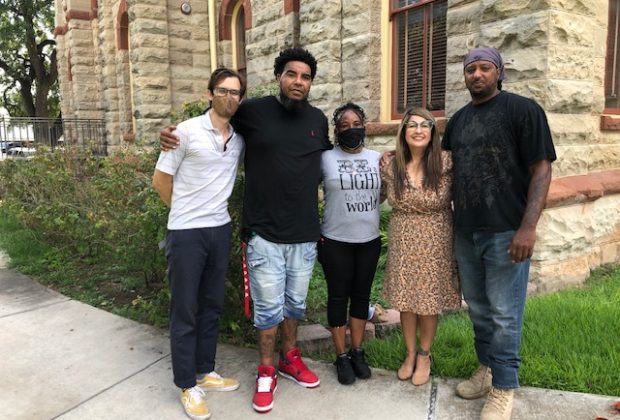County initiates removal of Confederate monument
By Wesley Gardner
LPR Editor
Caldwell County Commissioners on Tuesday voted to initialize the process of moving the Confederate monument from the courthouse lawn to the Caldwell County Jail Museum in Lockhart.
The decision comes after nearly two months of discussion on the topic that saw county residents on both sides of the issue spending nearly an hour each meeting presenting their views to commissioners.
Two weeks ago, commissioners approved a nine-person committee that was tasked with bringing back a recommendation to the court concerning the removal of the monument.
The recommendation included moving the monument to the Caldwell County Jail Museum, placing a plaque next to it that contextualizes it, and looking into the process of installing a new statue on the courthouse lawn that would honor the men and women who came to Lockhart on the Chisholm Trail.
County Judge Hoppy Haden, who was a member of the committee, stressed that the recommendation did not come lightly and took several hours to be formed.
“[The committee’s] members ranged in age and demographics,” said Haden. “More than half of them have lived here all their lives.
“Many of them, like me, lived here for decades … They were very thoughtful – had done quite a lot of research. When we first sat down together, the suggestions for the monument ranged from leave it where it stands and don’t do anything to take the plaque off of it, put the plaque in the museum and grind the monument up, so we were that far apart with the committee when it started. Everybody had ample time, as much time as they needed, to discuss their research — discuss what the monument meant to them, discuss the disposition of it.”
Haden noted that while the monument did, in part, honor fallen Civil War soldiers, the committee took into account the social unrest that’s still occurring today.
“I think what the committee felt was that it was less about the issue of slavery, which was decided during that war, but more about social issues that are going on today,” said Haden. “We recognized that, just like the committee, the citizens in this county range anywhere from ‘don’t touch that monument – don’t do anything,’ to ‘destroy it.’ When you have two polar extremes such as that, you’re never going to satisfy the groups of people in those two polar extremes, no matter what decision we make.”
Haden said he ultimately supported the committee’s recommendation.
Precinct 2 Commissioner Barbara Shelton made a motion to table the item until the county could look into the cost and logistics of having the monument removed, though it wasn’t seconded by another commissioner, leaving it dead on the floor.
Precinct 4 Commissioner Joe Roland, who was also a member of the committee, spoke about the difficulty of making a decision regarding the monument.
“I would ask the citizens of Caldwell County to try their best to put themselves in our place,” said Roland. “I’ve been sitting on this court for 30 years short of five months.
I’ve never had a decision this tough, and that’s saying a lot, because we went through a whole bunch. Were already divided, whether we vote, don’t vote, table it, or what. We’re already divided … This is one of the toughest things I’ve ever had to go through. Having said that, I think we need to bring it to a head. We need to vote on it, so people know where we are … Nobody actually wants to make this decision. I don’t.”
Precinct 3 Commissioner Ed Theriot said that while he agreed the county needs to look into the cost and logistics of having the monument removed, he ultimately supported the committee’s recommendation.
“During the last few months, we’ve all educated ourselves on the conditions in the 1920s in central Texas and Caldwell County, and specifically Lockhart,” said Theriot. “These conditions and circumstances that led to the installation of the Civil War soldier’s monument are cloudy at best.
“There was a clear effort to honor the aging – these folks were dying off at the time – the aging fathers and grandfathers of folks that lived in the county that had fought at the war. However, there was a strong movement going on to intimidate and suppress a large population in the county. That’s undeniable.”
Theriot noted that while he didn’t witness or endure racism growing up, he now understands that many Caldwell County residents did have those experiences.
“I grew up in Caldwell County out in McMahan, and I have never witnessed any of the overt acts of racism that we’ve heard folks on social media or other places referring to Caldwell County, nor have I ever heard of anyone black or white referring to the monument as a symbol of oppression growing up,” said Theriot.
“We’ve gone through a process that has helped me understand that though I never felt or witnessed any type of racism or oppression associated with the monument, others in our community have, and folks that I know and care for have. That disturbs me and has encouraged me to consider carefully the recommendation of the monument committee.”
Theriot said that while he does consider the monument to be a memorial to Civil War soldiers, he agreed that it needed to be moved to a more appropriate location in Lockhart.
Commissioners ultimate voted 4-1 to approve the process of removing the Confederate monument, with Shelton casting the dissenting vote.



